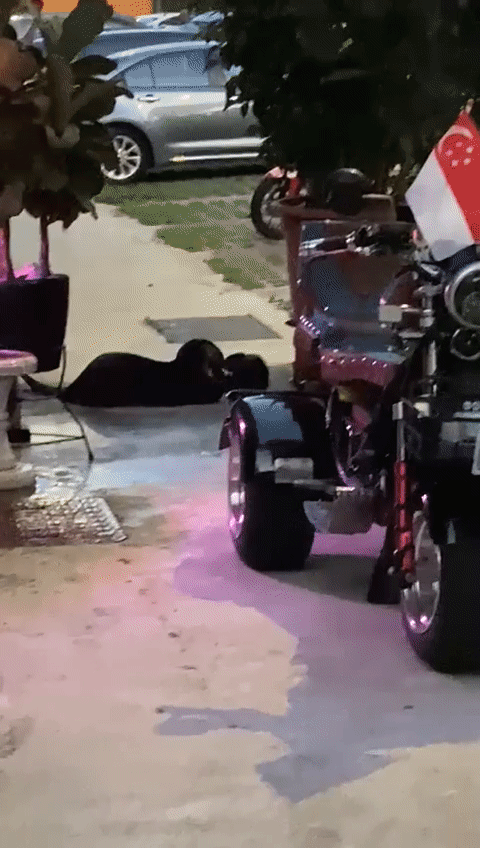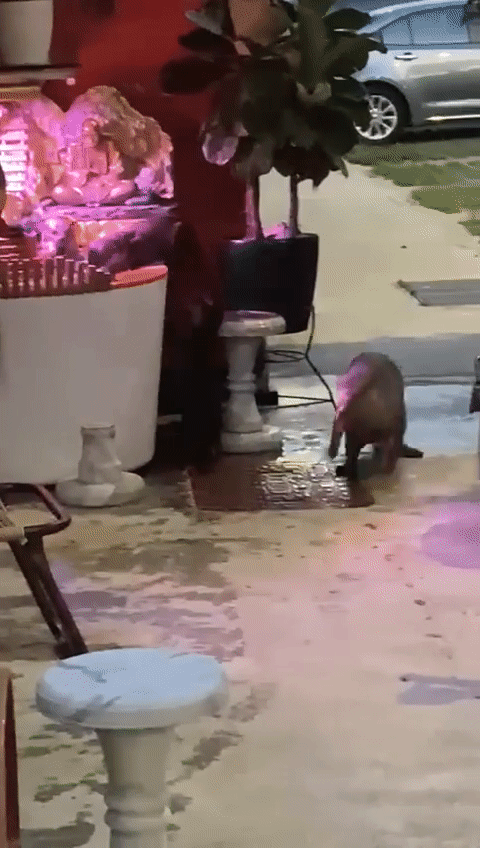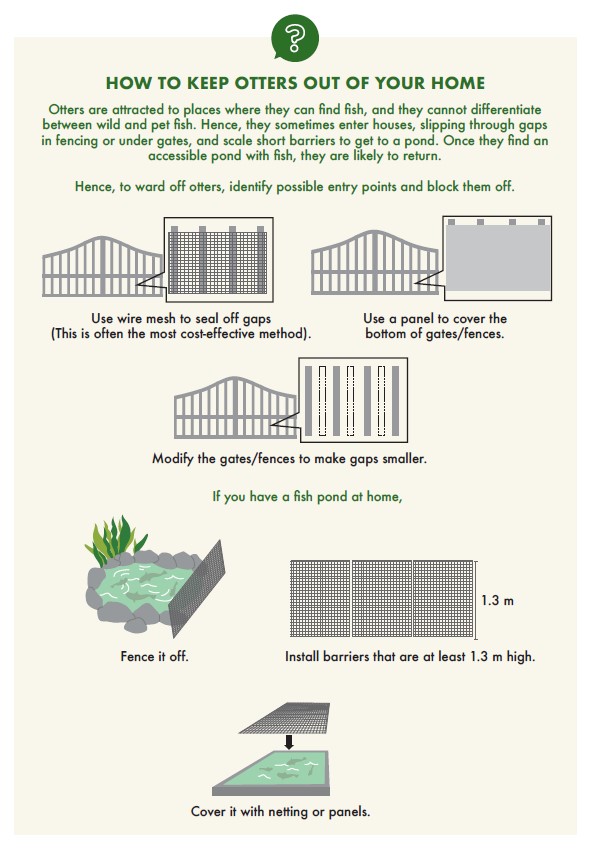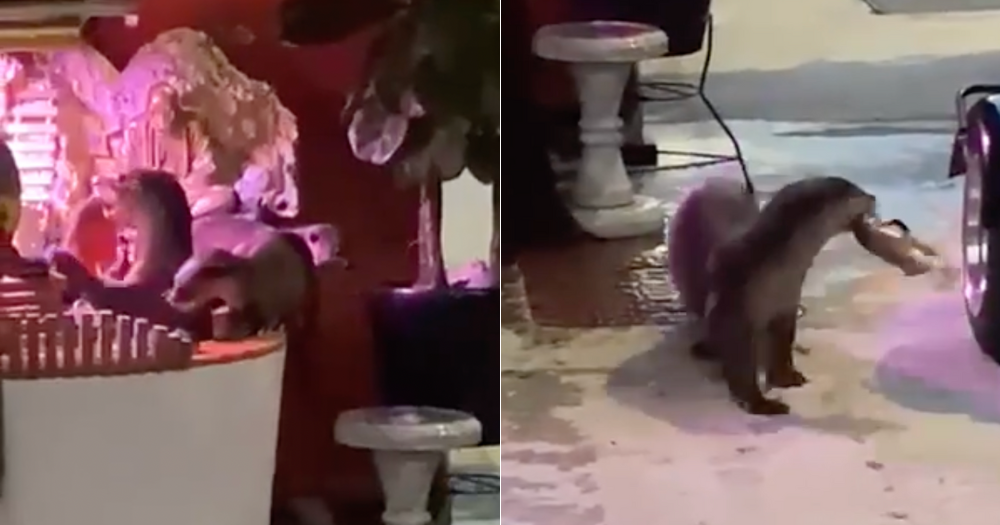
A 61-year-old man staying in the first floor unit at Block 111 Bukit Purmei lost all seven of his pet koi fish after they were eaten by otters on Sunday (Jul. 23) and Monday (Jul. 24).
The fish were housed in a fish tank outside his home.
The koi owner, Goh, shared his story with Chinese media Shin Min Daily News (Shin Min), which first reported on the incident on Jul. 25.
Five otters spotted
Speaking to Shin Min, Goh said that he was having dinner at the nearby coffee shop at around 6pm on Jul. 23.
Goh was suddenly alerted by his neighbours that otters had entered his home, Shin Min wrote.
The otters had even gone into his fish tank and eaten the koi fish which were swimming inside.
"At the time, there were five otters, which I believe are a family, and they ate six of the fish inside the tank," Goh was quoted as saying by Shin Min.
By the time the elderly man got home, the otters were already inside the fish tank, Shin Min reported.
Based on the video shared with Shin Min by Goh, the romp of five otters consisted of adults and younger pups.
At the beginning of the video, a bigger-sized otter, with a fish in its mouth, can be seen alongside a younger pup on the ground.
 Gif adapted from Goh's video, via Shin Min Daily News.
Gif adapted from Goh's video, via Shin Min Daily News.
The camera then pans and reveals three more otters – one inside the water with a koi in its mouth and two smaller-sized otters along the rim of the tank.
 Gif adapted from Goh's video, via Shin Min Daily News.
Gif adapted from Goh's video, via Shin Min Daily News.
The fish tank did not appear to be covered.
One by-stander in the background can be heard asking where "uncle" was, while another can be heard calling out for "uncle".
Otters came back for more
Thinking that the attacks on his koi were over, Goh told Shin Min that after the otters left on Jul. 23 evening, he proceeded to change the water in the tank for the last remaining koi fish.
Unexpectedly, at around 6am the next morning, two otters returned to finish off the last koi.
"I heard a commotion and went out to check on it. That was when I discovered that two adult otters had come back to eat the last remaining koi," Goh recalled, according to Shin Min.
10 months of pet-rearing efforts gone in two days
Goh revealed that he began rearing the koi fish 10 months ago after he suffered a stroke, Shin Min wrote.
"I've kept them for so long, but now they are gone in two days. What a pity," Goh lamented.
According to Goh, he had not seen the otters in the neighbourhood prior to the incident and expressed surprise at what transpired.
However, his neighbours told him that they had spotted otters in the nearby waterway in the past, although the waterway is a distance from Goh's residential unit.
Interconnected waterways facilitate otter movement
Otters prefer large waterways where there is an abundance of food.
However, otters who lose in the competition for territory and space with other otters will be forced to eke out a living in the remaining space available.
Under these circumstances, the interconnected waterways that run through the country become convenient highways which facilitate the movement of otters.
Otters may then end up in residential areas, where domesticated pet fishes in fish tanks are easy prey.
Earlier this year, the National Parks Board (NParks) shared that when otters have access to natural food sources but have entered residential areas to prey on easy targets in residential ponds, their presence are likely to only be transient.
To prevent the entry of otters into residential homes, residents can set up exclusionary measures, such as meshing up possible entry points along gates and fences.
If such measures are not possible to erect, such as in HDB estates, fish ponds or tanks may also be covered with nettings or panels to prevent otters from reaching the fishes.
 Image via NParks.
Image via NParks.
NParks' advisory
Here's what to do in the event of an encounter with otters, according to NParks' advisory:
- DO NOT touch, chase or corner the otters. Observe them from a distance. Going too close to the otters may frighten them.
- DO NOT talk loudly and do not use flash photography. Noise and light may scare and provoke the otters.
- DO NOT feed the otters. The otters have their own food in the environment and their natural eating habits keep the ecosystem healthy.
- DO NOT litter or leave sharp objects in the water. Clean and safe waterways filled with fish and aquatic life make good habitats for the otters to frolic and feed in.
- DO keep your dog on a tight leash. Your dog might chase the otters and frighten them, and keeping your dog on a tight leash will help to keep it safe.
Related story
Top image adapted from Goh's video, via Shin Min Daily News
If you like what you read, follow us on Facebook, Instagram, Twitter and Telegram to get the latest updates.


